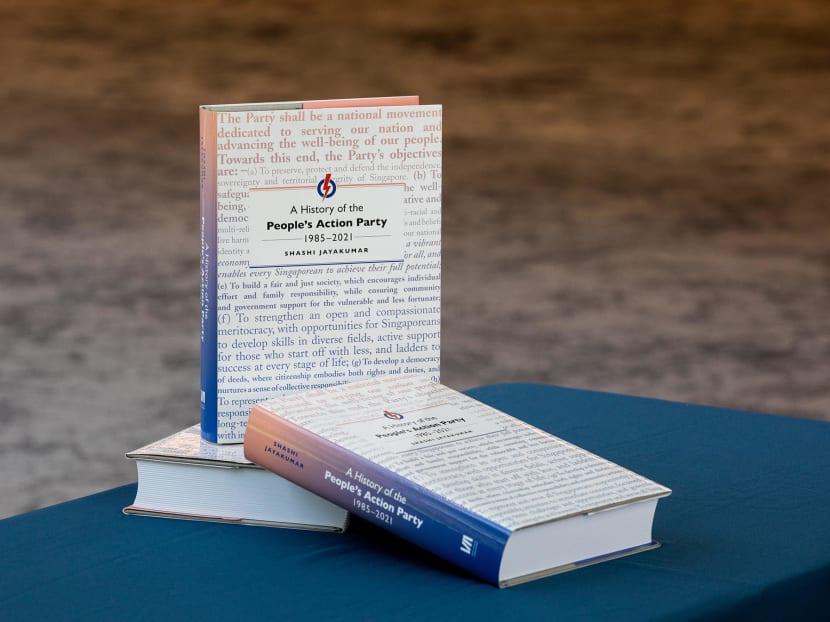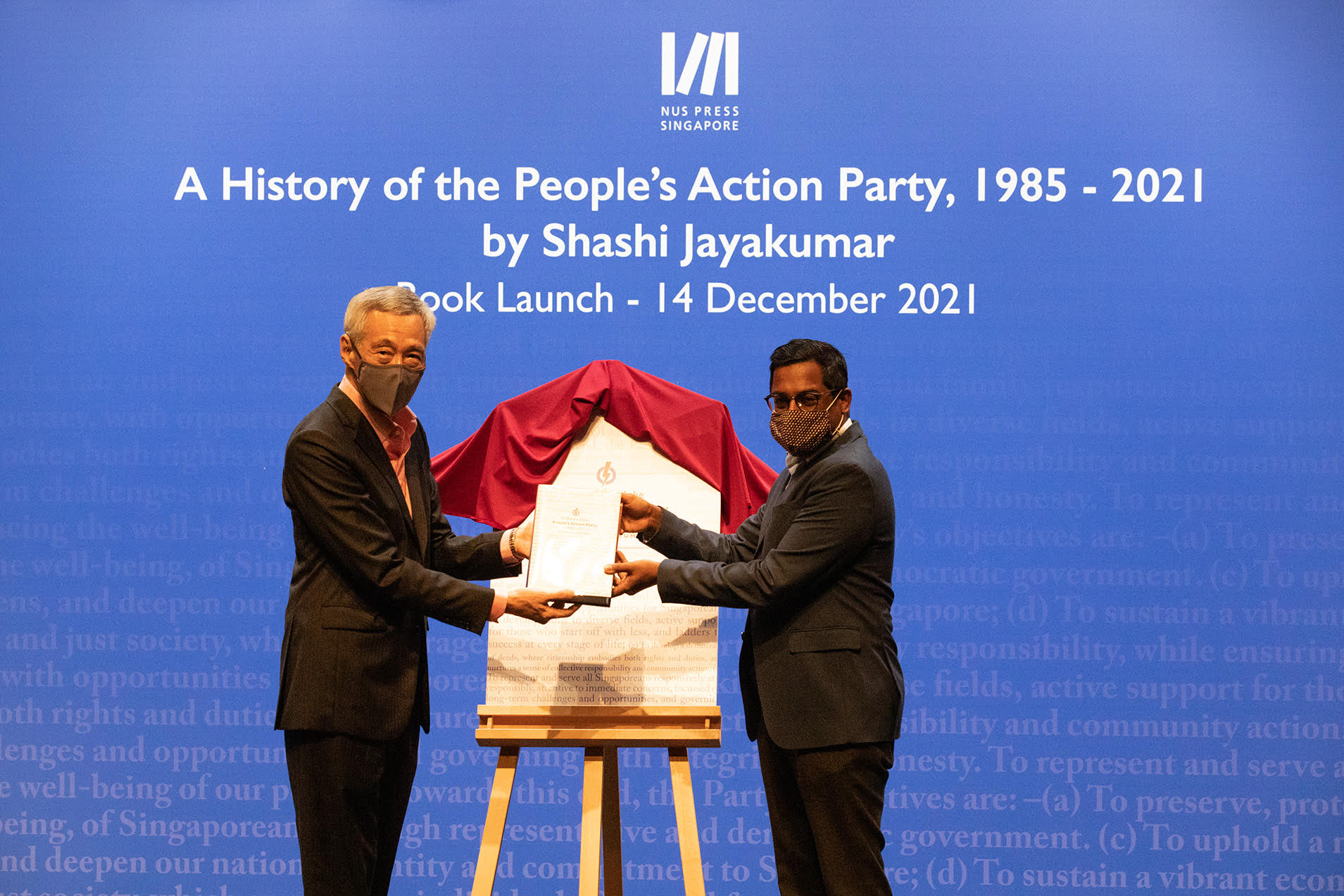With PAP at turning point, new book details challenges of attracting talent, strengthening emotional bond with youth
SINGAPORE — The younger generation’s emotional connection with the People’s Action Party (PAP) is very different from that of earlier generations, posing a “particular challenge” to the governing party now, a new book suggests.

A new book that chronicles the history of the People's Action Party after 1985 draws on interviews from more than 60 party leaders, including Prime Minister Lee Hsien Loong and his predecessors.
- A new book documenting the PAP’s history from 1985 to 2020 was launched on Dec 14
- The book draws on interviews from more than 60 party leaders
- Prime Minister Lee Hsien Loong said at the launch that just like in 1985, the ruling party is at a turning point now
- It is in the midst of a leadership transition and must adapt to the expectations of younger voters
- PAP will face a “critical challenge” in drawing talent, the book states
SINGAPORE — The younger generation’s emotional connection with the People’s Action Party (PAP) is very different from that of earlier generations, posing a “particular challenge” to the governing party now, a new book suggests.
The older generation observed tangible progress under years of PAP rule and formed a strong emotional bond with the party, but the younger generation grew up with relative wealth as an expectation, rather than a goal to strive for.
The younger set is also seeing the emergence of credible opposition candidates who connect as well as or even better than new PAP candidates, it noted.
The book, which traces PAP’s history over 36 years and seeks to explain the party’s ability to sustain its political longevity, was launched on Tuesday (Dec 14).
It was written by Dr Shashi Jayakumar, who is the head of the Centre of Excellence for National Security at the S Rajaratnam School of International Studies.
Titled A History of the People’s Action Party: 1985 – 2021, the 782-page publication draws on interviews from more than 60 PAP leaders, including Prime Minister Lee Hsien Loong, who is the party’s secretary-general now, and his predecessors.
Dr Shashi said that the book was the idea of the late Lee Kuan Yew, Singapore’s founding prime minister.
The eight-chapter book published by NUS Press follows decisions made by PAP leaders to respond to the changing demands of the Singapore electorate over the past three decades or so, and also addresses the challenges it will face in doing so after last year’s General Election.
These challenges include the ongoing problem of attracting quality candidates to the party, which will become more difficult in future.
This is partly due to voters’ demands, with Members of Parliament (MPs) interviewed for the book noting that people expect their MPs to be emotionally available and take an active interest in the lives of residents.
Former ministers interviewed also suggested that they may not join politics in this day and age when MPs are expected to be adept at projecting themselves in real life as well as on social media, where they can be subject to toxic personal attacks.
“Most fundamentally, our task is not to foretell the future, but to create it. The PAP continues to carry a heavy responsibility for Singapore’s security, stability and success.Prime Minister Lee Hsien Loong”
Speaking at the launch event held at the National University of Singapore’s (NUS) University Cultural Centre, PM Lee said that 1985 was the “turning point” in the party’s political development.
Just a year before that, at the 1984 General Election, PAP received less than 70 per cent of the overall votes for the first time since the country’s independence in 1965. Its vote share fell sharply by 12.9 percentage points.
The party also saw its older voters being replaced by younger, better-educated and more demanding ones.
Many of the PAP old guards stepped down from leadership roles or retired from Cabinet in that election, eventually making way for Mr Goh Chok Tong to become the leader of the younger ministers and be the first deputy prime minister shortly after the election.
PM Lee said that questions followed thereafter about PAP’s future and its political dominance.
It has been a continual challenge to connect with new voters, he added, and just like in 1985, the party is now at another turning point after last year’s General Election.
Last year, the PAP’s vote share fell by 8.6 percentage points and it lost two Group Representation Constituencies in Sengkang and Aljunied to the Opposition for the first time.
“Just like in 1985, we are again in the midst of a leadership transition, this time from the 3G (third-generation) to the 4G team. The PAP MPs who were first elected in 1984 have all retired — except for me,” PM Lee said.
The electorate, too, has changed. The pioneer generation of voters have “mostly faded away” and about 60 per cent of today’s voters were born after independence.
“Growing up in a stable Singapore, they experienced steady progress year after year. They have benefitted from our collective efforts to develop our economy and to build our Singaporean identity.
“Their aspirations, hopes and expectations are different from those of the young voters of yesteryear in the 1984 General Election who are their parents,” PM Lee noted.
Many questions about the party’s future are now on people’s minds, just as it was back in 1985, he added.
These include how the PAP Government will deal with new challenges, how the upcoming leadership team will take Singapore forward and whether the new generation of Singaporeans have the same survival instincts to bond with their leaders and gel together as one people.
No one can be sure about the party’s future, just as it was previously, and the next 35 years will be different from the last, PM Lee said.
“Most fundamentally, our task is not to foretell the future, but to create it. The PAP continues to carry a heavy responsibility for Singapore’s security, stability and success,” he added.

The book states that the “critical challenge” now is the ability for PAP to continually attract talent.
On top of having to find candidates outside of the traditional sources of the civil service or the private sector, the party will also have to compete with opposition parties such as the Workers’ Party for new talent.
In an interview with Dr Jayakumar, PM Lee said that it will be “harder and harder” to attract good people to the party.
This is because potential candidates will have to face negative comments on social media, put up with a greater financial sacrifice from switching careers and also face less certainty of winning in elections.
PM Lee was quoted as saying in the book: “But if we do not find the right people, the next team will be weaker, and if the team is weaker, it becomes even harder to maintain political dominance. It is a very serious problem.”











